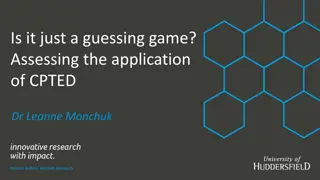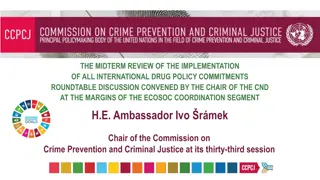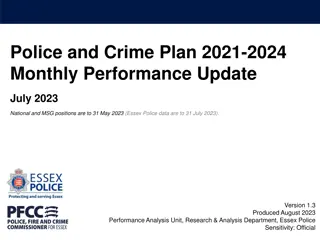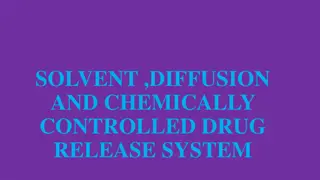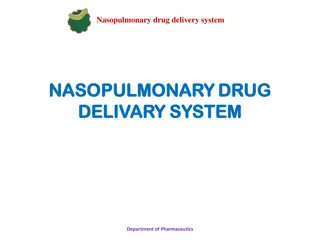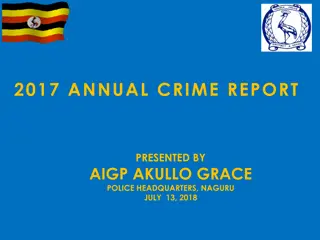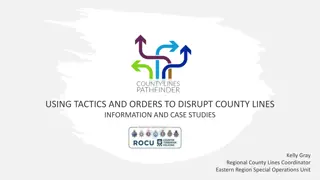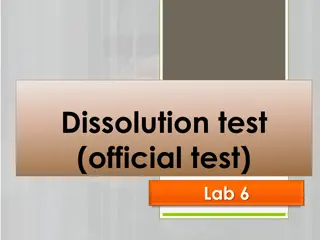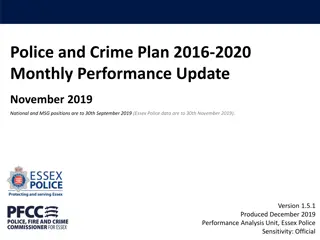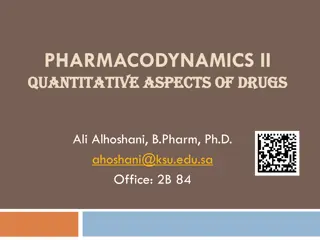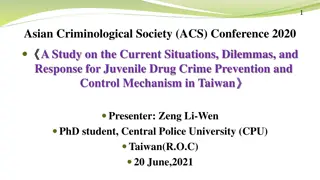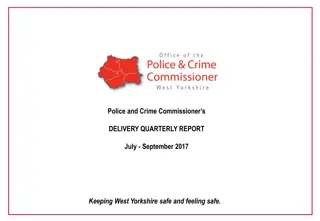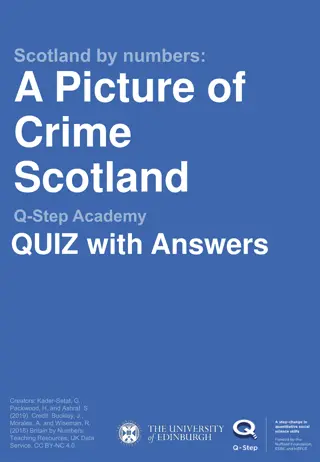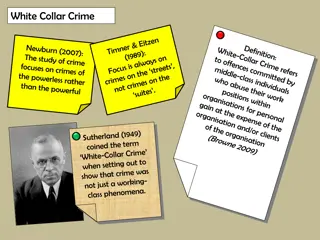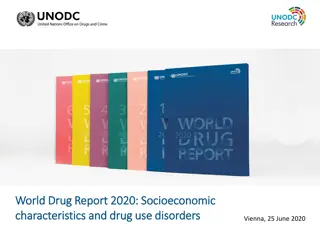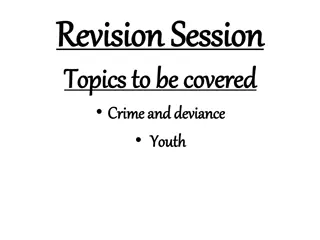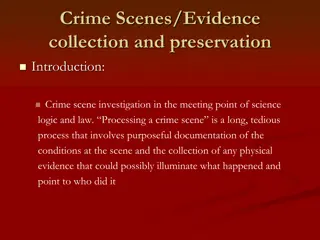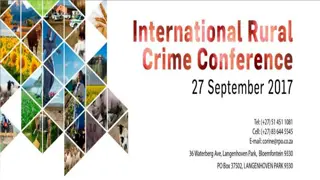
Organized Drug Crimes in West Africa: A Sociological Perspective
Explore the prevalence of drug crimes within West African organized criminal activities, delving into the impacts on societies and institutions. Learn about the different forms of illicit drugs, the organized crime groups involved, and the routes and hubs of drug trafficking in the region.
Download Presentation

Please find below an Image/Link to download the presentation.
The content on the website is provided AS IS for your information and personal use only. It may not be sold, licensed, or shared on other websites without obtaining consent from the author. If you encounter any issues during the download, it is possible that the publisher has removed the file from their server.
You are allowed to download the files provided on this website for personal or commercial use, subject to the condition that they are used lawfully. All files are the property of their respective owners.
The content on the website is provided AS IS for your information and personal use only. It may not be sold, licensed, or shared on other websites without obtaining consent from the author.
E N D
Presentation Transcript
Drug Crimes: Production, Transmission and use of drugs and narcotics substances within the West African Sub region: Organized criminal at work By Dr. Kamorudeen Adegboyega Department of Sociology Ahmadu Bello University, Zaria
West Africa offers many advantages for organized crimes and criminal activities. There are different types of organised criminal activities and operatives in West Africa. These include drug trafficking, advanced fee and internet fraud, human trafficking, money laundering and oil bunkering, among others. However, this paper examines organized crimes within the context of drug crimes. Drug crimes continue to be a substantial part of organized criminal activities in the sub region. Introduction Thus, drug crimes in West Africa are nothing more that the most visible symptom of a much deeper and destabilizing disease which is slowly but progressively affecting the bodies of African States and institutions. West African seashores and harbors have become the hub of transatlantic drug trafficking.
Conceptions of Organized Crime/ Criminal Groups In the old fashioned criminological analysis, organized crime as a concept was derived from the structure of mafia organizations with hierarchical structure with layers of position and corresponding tasks and powers. People participation in organised criminal activities are characterized by: (a) An intent to commit or the actual commission of substantive crime; (b) A conspiracy to execute crime; (c) A persistence of this conspiracy through time (at least one year); (d) The acquisition of substantial power, and the seeking of high degree of political or economic security, as primary motivations. (e) The criminal groups invest significant resources subverting the defenses that a state has erected to confront them.
.. Conceptions of Organized Crime/Criminal Groups are often well-organized and extremely profitable, which increases their ability to manipulate governance and undermine security
Illicit drugs are classified in the various forms in which they can be found and the effects they exude on the victims: they can occur naturally such as with marijuana (cannabis) or cocaine; they can be prepared from naturally occurring substances, such as the case with heroin; they can be totally synthetic, as in the case with amphetamines and most other prescription drugs Forms of Illicit Drugs
The Routes and Hubs of Drug Crimes in West Africa The Atlantic coast hub: composed of Guinea Bissau, Guinea, and to a lesser extent, Senegal appears to be the main beachhead for cocaine trafficking into the region. The cocaine is shipped to Guinea-Bissau from South America by sea or air. Part of the flow is then redirected to the surrounding international airports to be shipped to Europe through air couriers. The Sahelian hub stretches along the borders between Mauritania, Mali, Algeria, Niger, and Libya. It encompasses vast swathes of desert and arid lands that local law enforcement cannot effectively monitor and where local communities (Arabs, Tuaregs) have long thrived on illicit drug business.
The Routes and Hubs of Drug Crimes in West Africa The Gulf of Guinea hub goes from Ghana to the Niger Delta. It is a highly interconnected region where criminal networks overwhelmingly Nigerian are extremely mobile and well integrated.
Dynamics of State weakness and organized crime in West Africa The issues of State weakness and failure gained prominence in academic and policy circles shortly following the September 11 terrorist attacks. State weakness is considered a threat to national and international security, and weak/failed states are often seen as incubators for international security threats. While State weakness and failure is a relative concept in that no two States are ever exactly the same, there are some general attributes and indicators that point to the severity of weakness in a given State. State weakness is overly associated with widespread armed conflict; weak States are those that lack the essential capacity and/or will to fulfill four sets of critical government responsibilities: fostering an environment conducive to sustainable and equitable economic growth; establishing and maintaining legitimate, transparent, and accountable political institutions; securing their populations from violent conflict and controlling their territory; and meeting the basic human needs of their population (Rice and Patrick 2008, 3)
.Dynamics of State weakness and organized crime in West Africa Rice and Patrick (2008: 22) also found that state weakness is directly related to poverty, stating that On balance, poorer countries tend to be weaker ones. Poverty fuels and perpetuates civil conflict, which swiftly and dramatically reduces state capacity . Many West African States have proved to be unable to offer appreciable levels of development to their citizens.
West Africa has long produced cannabis, mainly for local consumption, but is now also becoming a producer and exporter of synthetic drugs such as amphetamine-type stimulants (ATS). Since the mid-1990s, in West Africa, trading in hard drugs and narcotics has become a booming business, with increasingly serious side effects. Patterns of Drug Crimes in West Africa The drugs trade is currently valued at hundreds of millions of dollars in West Africa, a region where the majority of the countries are still among the poorest in the world. The growth of crimes has been accompanied by increasing local consumption of illicit drugs In the absence of reliable data, it is not possible to report exactly how many people are affected and how many of those who use drugs are dependent. But there is little doubt that consumption is increasing, and that the region is neither prepared nor equipped to deal with the problem.
As at the mid-2000s, the patterns of drug crime in the sub region have taken on a dimension that threatens the security, governance and development trajectory of many countries. International drug cartels, in league with various West African criminal networks, began using the region mainly as a transhipment point to channel cocaine from South America to Europe and North America. The region has seen increases in drug use, the growing regional production and trafficking of ATS and the involvement of senior officials in drug trafficking. Transnational criminal networks largely control the trade, facilitated by the fact that they are operating in a poor region affected by political instability, unemployment and corruption. Patterns of Drug Crimes in West Africa
These networks include criminal elements active in the large West African diasporas in Europe, North America and Latin America. Members of these diasporas are important both for establishing connections to drug cartels, drug producers or dealers and on-the-ground fixers and enablers , and for repatriating the profits back to West Africa in various forms. Unfortunately, high unemployment makes the illicit drug an attractive source of income, particularly among young people who make up the bulk of the population in most countries. In the context of widespread poverty, corruption and state fragility, many unemployed young people in West Africa are just as likely to regard drug dealing as an income-generating opportunity as they are to view it as an illegal activity. Patterns of Drug Crimes in West Africa
Implications of drug crimes on security in West African States Drug crimes poses a significant and growing threat to national and international security, with dire implications for public safety, public health, democratic institutions, and economic stability across the globe. From a political point of view, drugs traffickers have hijacked the entire policy and political processes of governments and States in West Africa including Nigeria, and also institutionalized criminality in the conduct of public affairs. Guinea Bissau stands out in West Africa. Another consequence of drug crimes in the sub region is the erosion of human capital, causing permanent physical and emotional damage to users and negatively impacting their families, coworkers, and many others with whom they have contact.
..Implications of Drug Crimes In West Africa Drug crimes are also a threat to the economic development of the sub region. Economic development is a principal agenda in national security council s throughout the world. At first glance, it might be argued that the drug trade bolsters financial reserves, generates capital and creates employment, which accrues to overall economic growth. In reality however, drug money has no significant macroeconomic push effect and makes no meaningful contribution to the prosperity of the West African community. Another security threats arising from the growing incidence of drug trafficking in Nigeria and the West Africa sub-region stems from the ability of criminal networks and illicit funding to infiltrate security and government agencies, transform or influence the motivations of its members, reorient objectives towards the spoils of drug trafficking activity thus influencing questions of state legitimacy and the legitimacy of democratic processes
.Implications of drug crimes in the sub region The continuous existence of drug crimes in the region weakens institutions and symbols that protect statehood, as drug traffickers are able to penetrate the highest levels of military commands and also install favorite politicians into office through financing of elections. The case of Guinea-Bissau in the last few years was an example. Increased distribution and abuse of narcotics are often bringing a host of other problems such as larger domestic criminal groups, lower economic productivity, and higher rates of drug addiction and dependence. In some countries, the ruling elite, the security services or extremist groups have competed sometimes violently for access to the spoils of drug trafficking, deepening political instability
A broad range of policy and operational responses have been adopted to better respond to drug trafficking in West Africa. Before 2001, drug law enforcement departments in West Africa did not have appreciable collaboration with one another. Thus, drug traffickers have taken advantage of this communication gap between them to establish cells across the region and move along the West African corridor with relative impunity. Indeed, where intelligence is to be shared with neighboring countries, one Agency would find it difficult to release the information because of the uncertainty of the preservation of confidentiality of the information in the destination country. This situation led to the founding of the West African Joint Operations initiative (WAJO). Overview of the Regional Efforts on Drug Control The WAJO initiative commenced as a collaborative effort between Nigeria s National Drug Law Enforcement Agency (NDLEA) and the United States Drug Enforcement Administration (DEA) Regional Office in Lagos
The focus of WAJO was to contain the exploding illicit drug trafficking problem across the region. This, in turn, would create the opportunity for harmonization of the core activities of policing agencies within the region, and help to expand the collective drug law enforcement scope, capacity and effectiveness for improved social security and well- being of the people of the Region. Overview of the Regional Efforts on Drug Control There was also the adoption of the Political Declaration on the Prevention of Drug Abuse, Illicit Drug Trafficking and Organised Crime in West Africa the Abuja Declaration and an accompanying Regional Action Plan. Other mechanisms for responding to drug trafficking include the ECOWAS Counter-Terrorism Strategy and Implementation Plan adopted in February 201315 and the ECOWAS Integrated Maritime Security Strategy, finalized in November 2013 However, these initiatives still remain weak. Interdiction efforts, though improving, are hampered by capacity constraints and interference by the well-connected.
First, it is essential for our leaders to become conscious of the severity of the situation; Second, there must be a joint coordinated response to the threat. The enemy is very powerful, extremely wealthy and knows no borders; Third, a strong public awareness has to be created which empowers the citizens of the various countries to resist a threat which they don t want but which they fear is greater than them; Fourth, any respectable programme requires adequate funding; Fifth, the necessary technologies must be made available. For example, intelligence gathering and analysis is at the heart of detection and interdiction Looking Forward
..Looking forward Sixth, adequate and pertinent training is a prerequisite to efficient intervention in combating the trade in illegal drugs.

